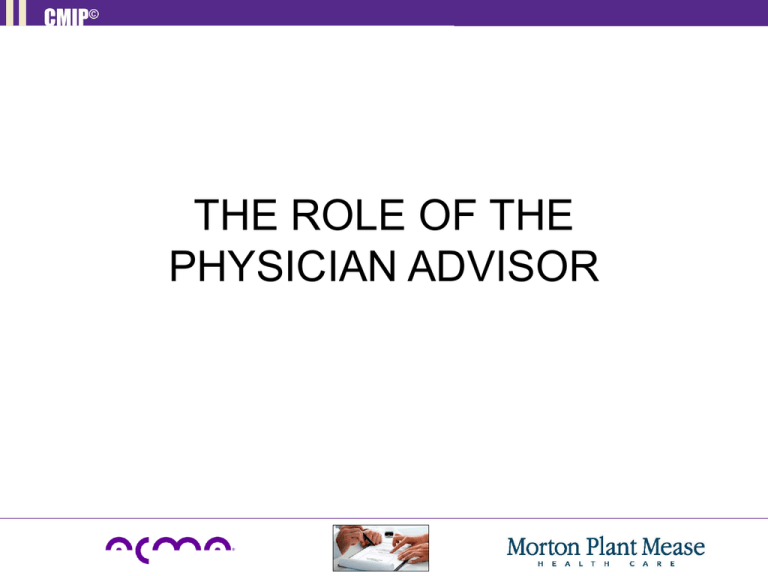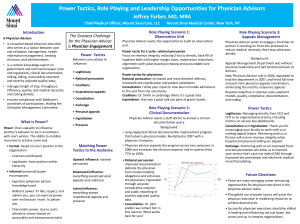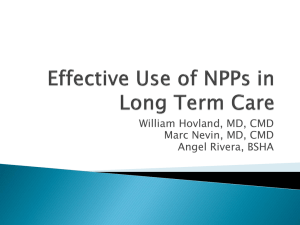THE ROLE OF THE PHYSICIAN ADVISOR
advertisement

THE ROLE OF THE PHYSICIAN ADVISOR "The role of Medical Director or Physician Advisor for Case Management often requires the review of other physicians’ cases, and critical scrutiny of their plan of care and resource management. Case review can be necessary for various reasons: outlier or extended stays, utilization review or reimbursement issues, or quality concerns..." Collaborative Case Management, Summer 2007 Objectives • Identify the role of the Physician Advisor for a hospital based Case Management program. • Understand the various functions of a Medical Advisor. • Describe effective strategies to enhance medical staff collaboration in the management of complex patients. Responsibilities of The Physician Advisor • • • • • • Champion for your Case Management program, supporting review functions. Work with hospital administration and clinical committees to develop processes and guidelines to improve quality of care. Educator and negotiator with the medical staff. Provide perspective on UM program from the Physician point of view. Liaison between Managed Care companies and the Providers. Member of the Utilization Review Committee. Desirable Characteristics for a Physician Advisor • 5+ years medical staff experience • Strong communication skills • Appropriate knowledge base (medical necessity criteria) • Respect of peers • Flexibility/Availability • Approachability • Credibility Desirable Characteristics for a Physician Advisor (Cont’d) • • • • • • • Not afraid to take an unpopular stand Willing to educate peers Willing to assist in counseling peers Willing to keep abreast of new criteria Willing to advise peers Acceptance of medical staff Leadership capability Benefits Realized with a Physician Advisor • Reduced length of stay due to early. intervention with barriers to discharge. • Education resource for Case Management team. • Appeal of concurrent and retrospective denials. • Direct communication with attending physicians. Benefits Realized with a Physician Advisor (Cont’d) • • • • • Decreased avoidable days Decreased denials Decreased cost Improved documentation Improved use of resources The P.A. role includes... • Advisory Role • Administrative Role • Educational Role Advisory Role •Available to the Case Management team on site, by phone, or electronically. •Support Case Managers via review of case information to assist with the best plan of action for the patient. •Direct interaction with the Medical Staff to resolve issues that affect utilization management or quality. Advisory Role (Cont’d) • • • • • Provides clinical support with issues regarding documentation. Provides support when lack of response by physician to query. Assists the case managers in medical necessity issues. Contact physicians when not responding to case managers. Assists in phone calls and/or meetings with medical directors of managed care or insurance companies regarding denied payments. Administrative Role • • • Review referred cases for medical necessity and appropriate level of care. Review of difficult cases referred by Case Managers to improve Case Manager/Physician interaction. Assist Case Management in situations when a Physician’s involvement is necessary (i.e. meetings with managed care companies, meetings with physician’s to address quality or UM issues). Educational Role • Attending rounds or length of stay meetings regularly to provide education and insight for effective management of cases. • Review physician practice/behaviors and provide education as needed per your hospital protocol. • Educate the medical staff to increase their collaboration and cooperation. • Advise Administration on complex cases. Educational Role • General medical staff and board of trustees presentations. • Communicate PRN with payer medical directors. • Co-Chair of UR Committee (varies by hospital). • 1:1 and department presentations regarding: • inappropriate utilization • LOS issues • avoidable issues • inappropriate status (obs/inpt) • potential denials Key Elements Of P.A. Job Description 1. Role Description and Reporting 2. Experience 3. Accountability Targets (“Deliverables”) 4. Availability 5. Minimum Requirements ( per facility job description) 6. Duties 7. Specialized Skills CFCM: Ed Grant RNC, ANP, MHA PHYSICIAN ADVISOR Job description (Insert facility specific P.A. job description) Advantages of Physician Advisor •Decreased Length of stay •Decrease hospital costs •Decreased Avoidable days •Improved documentation •Decreased denials •Improved use of hospital resources In Summary…………………. “The effective physician advisor is above all a Team Player committed to excellence in relationships and professional excellence.” William Wessinger, MD Medical Director Memorial Health University Medical Center Savannah, GA Review Questions 1. The role of the physician advisor includes all of the following, except: a. Education b. Administrative c. Provides biased suggestions d. Advisory Review Questions 2. True or False: Some of the necessary characteristics of the physician advisor include strong communication skills, availability, and respect of peers. Answer Key 1. C 2. True References • ACMA: Collaborative Case Management, Summer 2007 • The Leaders Guide to Hospital Case Management Daniels, Ramey 2005, Jones and Bartlett Publishers. • The Center for Case Management, Spring 2002, Volume 2, No. 2, Zander/Grant. • William Wessinger, MD Medical Director Memorial Health University Medical Center Savannah, GA • Mark Michelman MD,MBA Medical Director Morton Plant Mease Hospitals Clearwater, FL





